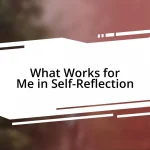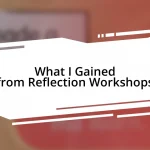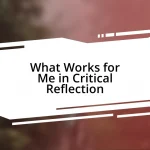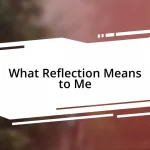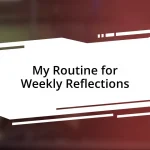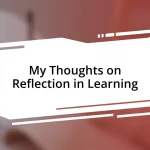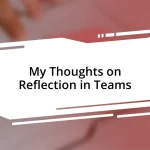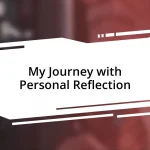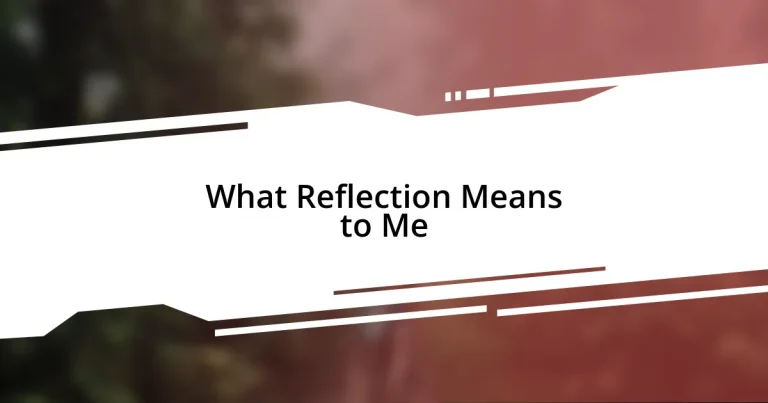Key takeaways:
- Reflection serves as a tool for personal growth, helping to transform setbacks into valuable learning experiences.
- Engaging in regular reflection fosters deeper connections with core beliefs and enhances daily interactions.
- Establishing consistent reflection practices, such as journaling and setting specific goals, supports ongoing self-discovery and emotional understanding.
- Reflection facilitates a greater understanding of past experiences, enabling clarity and guiding future actions and decisions.
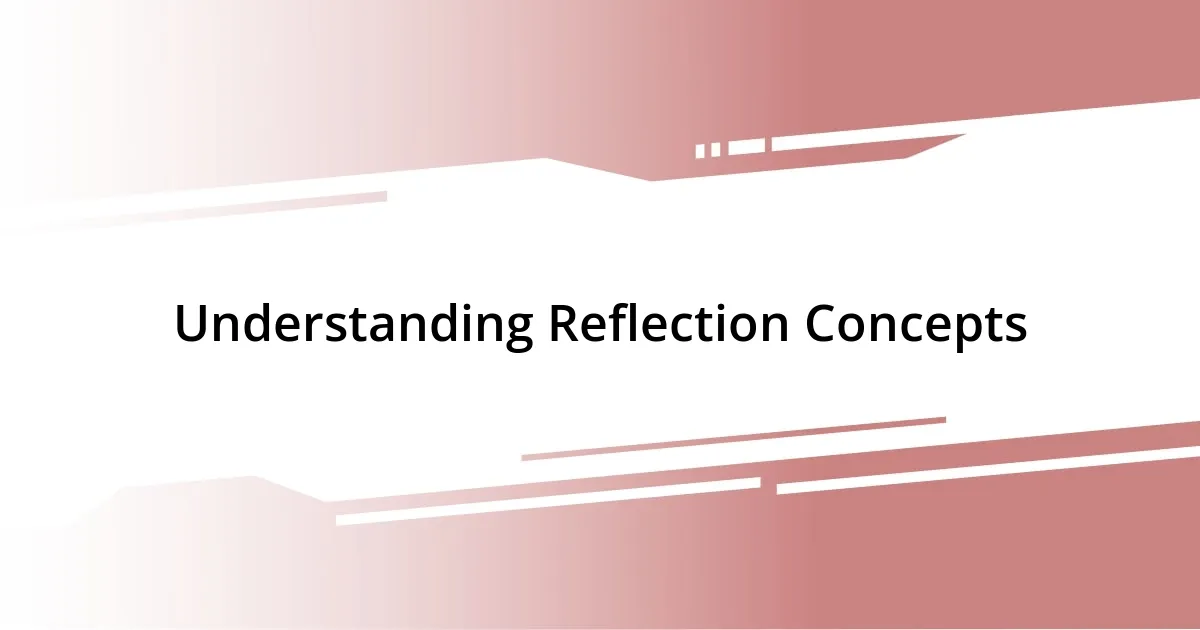
Understanding Reflection Concepts
Reflection, to me, is like holding up a mirror to my experiences. I often find myself revisiting moments, both big and small, and asking, “What could I have done differently?” This question sparks a deep internal dialogue and often leads to surprising realizations about my choices and behaviors.
I remember a time when I struggled with a difficult decision at work. It was only after reflecting on my feelings and motivations that I enabled myself to understand what truly mattered to me. This process wasn’t just about evaluating my actions; it was about exploring my values and understanding how they align with my goals.
Reflection also feels like a journey through memories that often stir emotional responses. Has there been a moment where you looked back and felt a rush of nostalgia or regret? For me, those moments often lead to clarity about my path forward. Reflecting helps me to make sense of my life’s narrative, turning chaos into comprehension.
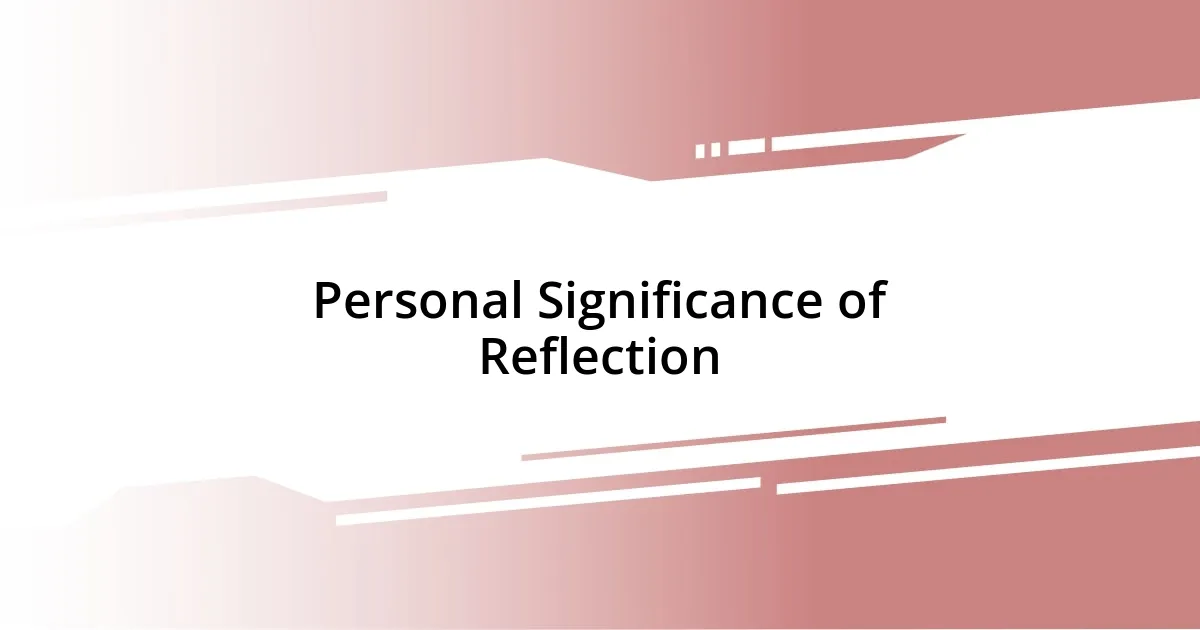
Personal Significance of Reflection
Reflection holds a special place in my heart. It’s like peeling away the layers of an onion, revealing deeper truths about myself. I recall a time when I faced a setback in my personal life; I spent hours considering what went wrong. This introspective process helped me transform pain into growth, allowing me to emerge stronger and more resilient.
The significance of reflection extends beyond decision-making; it connects me to my core beliefs. I think back to my childhood, recalling how my family’s values shaped the person I’ve become. Reflecting on these foundational moments reminds me of the importance of staying true to who I am, despite life’s distractions and challenges.
Sometimes, I find myself in a quiet place, just thinking. I often ask myself, “What have I learned today?” It’s during these moments that I discover insights I hadn’t recognized before. This daily practice of reflection enriches my understanding of daily interactions, gradually illuminating paths I hadn’t considered.
| Aspect | Significance |
|---|---|
| Growth | Transforming setbacks into personal development |
| Values | Connecting with foundational beliefs |
| Daily Insights | Learning from everyday experiences |
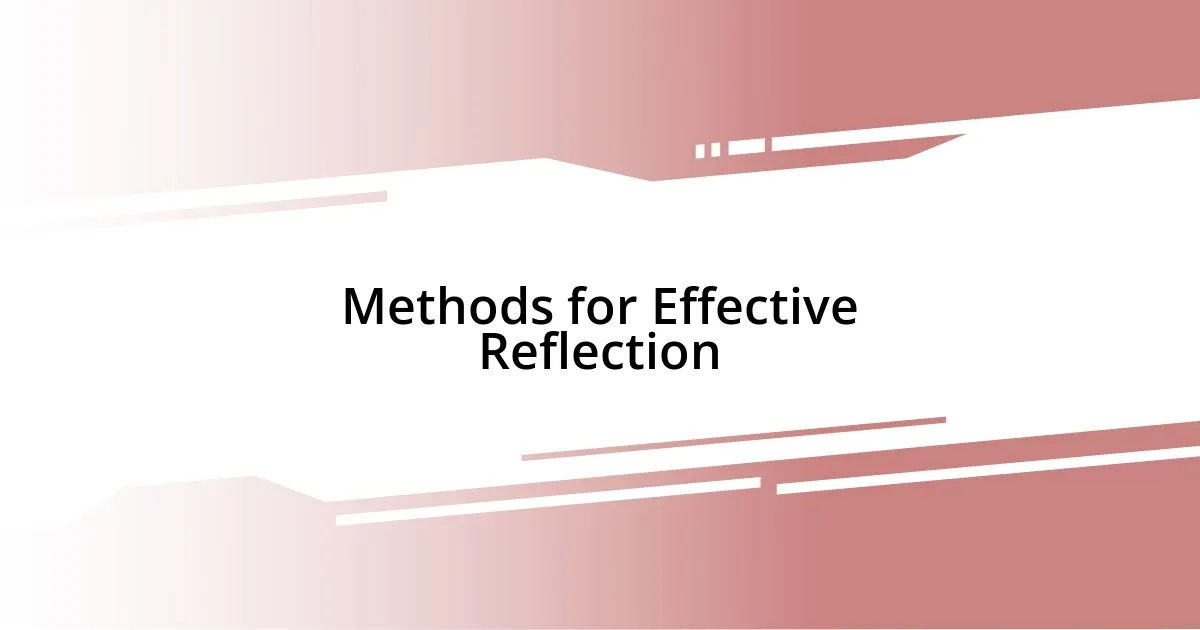
Methods for Effective Reflection
When it comes to effective reflection, I’ve found that setting aside dedicated time makes all the difference. For instance, after a long week, I often take Sunday afternoons to sit down with a journal. It’s surprising how simply writing my thoughts can offer clarity. The act of putting pen to paper allows emotions to surface, and I can analyze situations from various angles without clouds of stress or distraction.
Here are some methods I personally endorse for effective reflection:
- Journaling: Write down your thoughts and feelings after significant events to explore them further.
- Mind Mapping: Create a visual representation of your thoughts to connect ideas and reveal patterns.
- Timed Reflection: Set a timer for ten minutes to think deeply about a particular moment or decision, giving yourself the freedom to explore without feeling rushed.
- Discuss with a Trusted Friend: Sharing your reflections can provide new perspectives and insights that you may not have considered alone.
- Meditation: Taking a moment to breathe and focus helps clear the mind, allowing for deeper introspection.
Each time I engage in one of these methods, I learn something new about myself. Recently, I tried mind mapping after a project didn’t go as planned. As I drew out my thoughts, I discovered that improving communication would have changed the outcome significantly. This wasn’t just about the project; it was a valuable reminder that collaboration is key in both personal and professional relationships. Reflecting using these methods fosters not only growth but also a deeper connection with my own experiences.
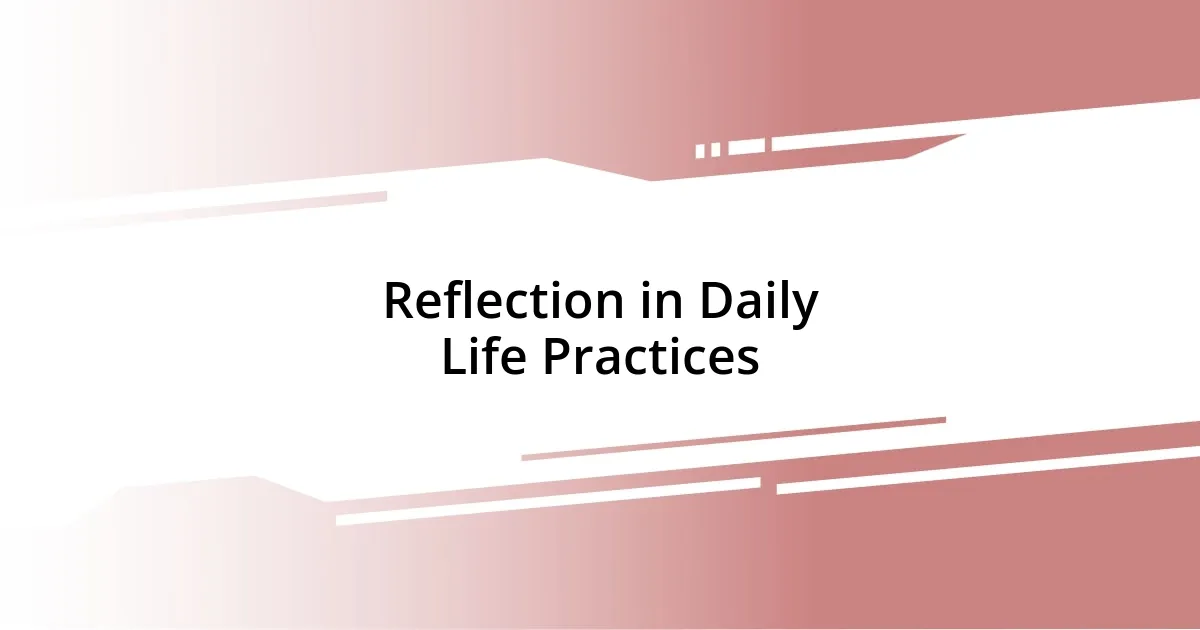
Reflection in Daily Life Practices
Reflection weaves seamlessly into my daily life, often in the most unexpected moments. Just the other day, while waiting in line at my favorite coffee shop, I started to think about the interactions I had that week. I couldn’t help but wonder, “How did my words affect those around me?” This small pause led me to appreciate how a simple thank-you can brighten someone’s day. Such realizations remind me that reflection truly enhances my daily interactions.
I also find that my daily commute serves as another intriguing time for reflection. Whether I’m on the bus or walking, it’s my sanctuary of introspection. During one of these commutes, I recalled a conversation where I mishandled a friend’s feelings. Instead of brushing it aside, I took that experience to heart. “What could I have said differently?” I wondered. This question allowed me to better understand empathy’s role in communication, guiding me to be more mindful in future conversations.
Moreover, I’ve started incorporating reflection into my evening routine. As I wind down, I take a few minutes to assess the day’s events. I ask myself, “What brought me joy today?” It’s incredible how recognizing these moments helps cultivate gratitude. Just last week, it was noticing a stranger’s smile that made my day. Reflection transforms these fleeting instances into lasting memories, reminding me to seek joy even in the mundane.
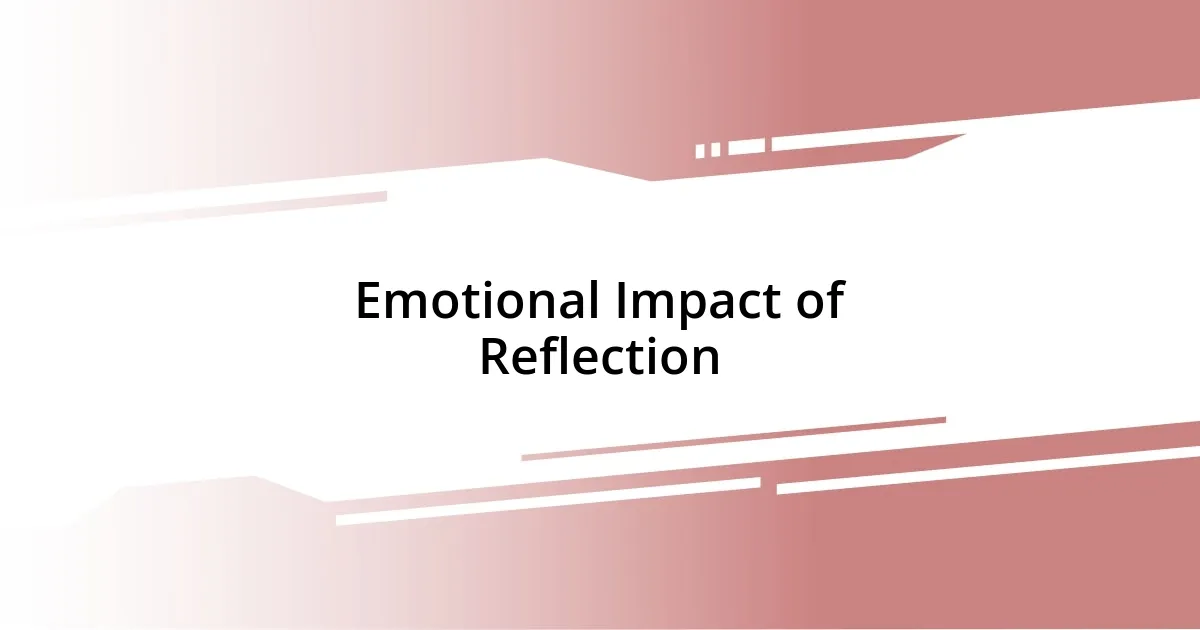
Emotional Impact of Reflection
Finding emotional depth through reflection has been a game-changer for me. I remember one particularly tough morning when I felt overwhelmed by life’s demands. Taking a moment to pause and reflect, I asked myself, “What’s causing this weight on my shoulders?” This simple question opened up a floodgate of emotions, revealing unprocessed stress from work and personal expectations. Allowing myself to feel these emotions was liberating; it reminded me that everyone experiences moments of struggle.
Sometimes, I’m surprised by how much reflection can evoke nostalgia. I once stumbled upon an old photo album and couldn’t help but dive into a sea of memories. As I flipped through the pages, I recalled the joyous moments and heartaches that shaped who I am today. Moments of laughter and even tears intertwined, making me realize that every experience, whether good or bad, is a piece of my emotional landscape. Reflecting on this journey allows me to embrace my past, acknowledging its role in my present.
I often find myself thinking, “What would I say to my younger self?” It’s a powerful exercise that sheds light on my emotional growth. For instance, during a recent reflection, I thought back to a time when self-doubt plagued my decisions. Imagining myself advising that version of me, I realized just how far I’ve come. This question not only enhances my self-awareness but also nurtures compassion for my own journey. In this way, reflection becomes more than just a practice; it’s a pathway to understanding and healing my emotional self.
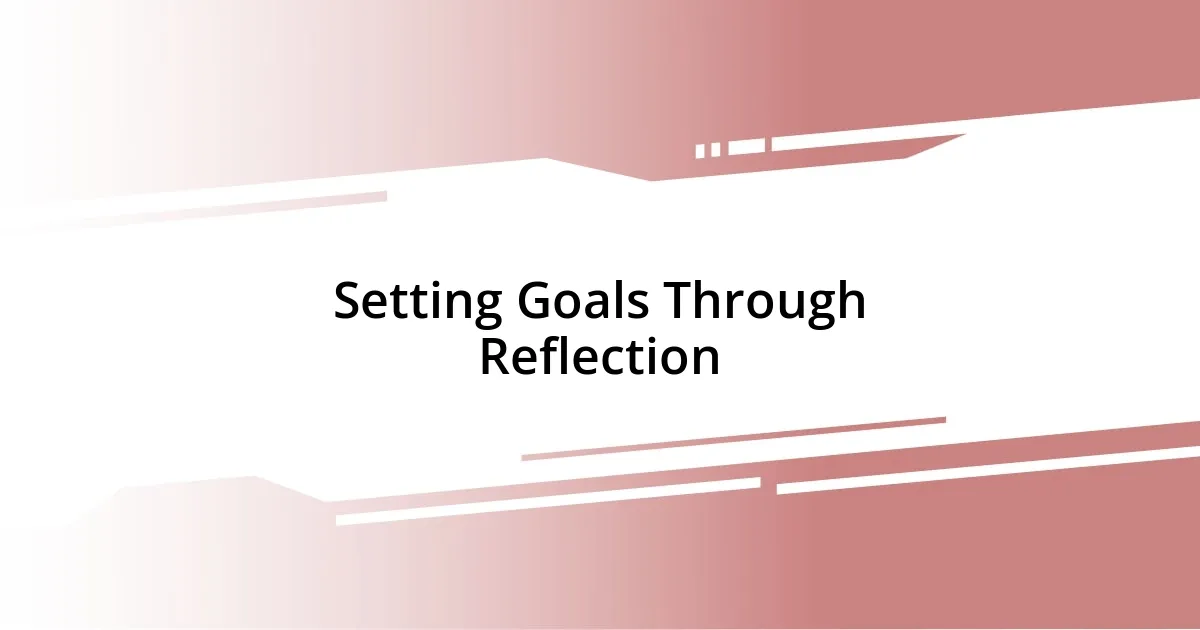
Setting Goals Through Reflection
Setting goals through reflection has become an essential part of my personal growth journey. Not too long ago, I found myself feeling stuck in a routine that seemed uninspired. I took a quiet afternoon to reflect on the past year and asked myself, “What do I truly want to achieve?” This simple yet profound question sparked a series of realizations, leading me to outline specific, actionable goals that aligned with my passions and values.
One detailed reflection I had was about my career aspirations. I remember scribbling down my long-term vision while considering my daily challenges. “Am I really working towards what fulfills me?” I pondered. This introspection illuminated areas where I was merely coasting instead of actively pursuing growth. It motivated me to break down my goals into smaller, manageable steps, making the path ahead feel less daunting and more exciting.
As I sit down to engage in this reflective practice, I find myself asking, “What lessons have I learned from my successes and setbacks?” This inquiry often leads me to insights that inform future targets. For example, after successfully completing a challenging project recently, I reflected on the strategies that contributed to its success. It was illuminating to recognize how collaboration and open communication were key factors. This awareness not only reinforces my goal to prioritize teamwork but also instills confidence that I can face future challenges with a clearer approach.
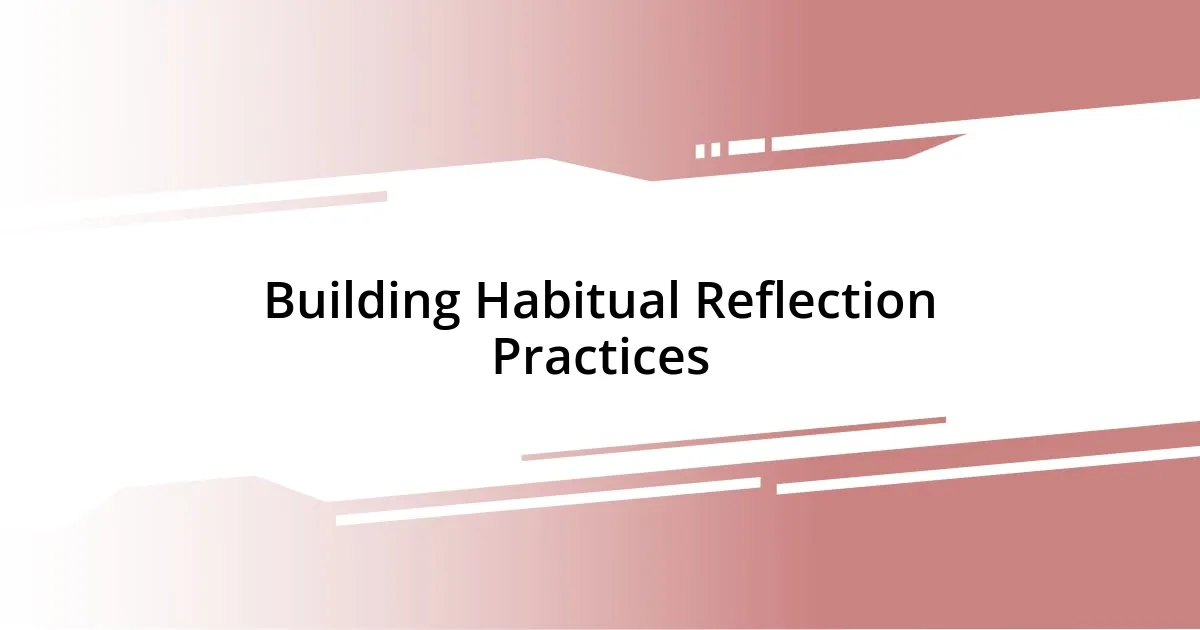
Building Habitual Reflection Practices
Building habitual reflection practices has been a gradual yet rewarding journey for me. I started by dedicating just a few minutes each day to jot down my thoughts in a journal. I remember feeling hesitant at first, wondering, “Will this really make a difference?” But over time, I began to notice how these small moments of reflection help me clarify my feelings and priorities, creating a sense of peace amidst the chaos of life.
One method I’ve found effective is the use of prompts. I’ll often ask myself, “What went well today, and what didn’t?” This question not only invites me to celebrate my successes but also encourages me to delve into the reasons behind my challenges. For instance, reflecting on an unexpected conflict with a friend led me to uncover my own insecurities and communication gaps. Instead of merely brushing it off, I was able to transform the situation into an opportunity for growth, showing me that reflection can be a bridge to deeper understanding and connection.
I’ve also realized the significance of consistency in building these practices. I now schedule weekly reflection sessions, allowing me to step back and view my progress more holistically. I’d often ask, “How have my choices aligned with my values?” This question has become a touchstone during these sessions. Recently, I identified that I was neglecting my creative pursuits—something I deeply value. Recognizing this gap reignited my passion, motivating me to carve out time for artistic endeavors again. By turning reflection into a habitual practice, I continuously reshape my path toward a more fulfilling life.

